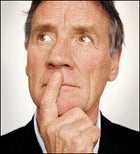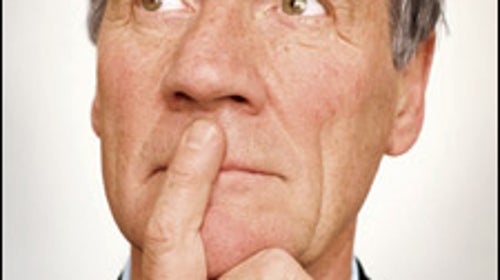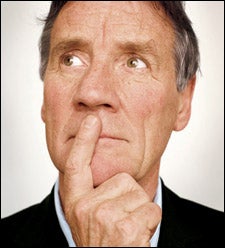In 1988, Michael Palin set out on his first BBC travel series, Around the World in 80 Days, which had him following the fictional voyage of Jules Verne’s Phileas Fogg. What began as a lark clearly unearthed some deep-seated wanderlust, because five series—and five best-selling tie-in books—later, Palin has just completed his latest, Himalaya, which airs June 20 to July 24 on the Travel Channel. (The accompanying book comes out June 17; BBC Video releases a DVD set of the series on July 19.) Armed with what appears to be no more than some chinos and half a dozen oxford shirts, Palin, 62, travels 3,000 miles through one of the globe’s most extraordinary and difficult-to-traverse regions, running into Maoist guerrillas in Nepal, cocksure helicopter pilots in Kashmir, the Dalai Lama in India, intrepid mountaineers on 26,504-foot Annapurna, and vestiges of the British Empire, including a high-altitude polo match in Pakistan. David Rakoff recently caught up with Palin in the relatively low-lying comfort of an 18th-floor hotel suite in New York City.
Michael Palin
 Michael Palin
Michael Palin
OUTSIDE: In 1998, after looping the entire Pacific Rim to make Full Circle, you claimed you were done with travel shows. But then you made Sahara in 2002, and now Himalaya. What keeps sending you back out there?
PALIN: After each series, I’ve thought, We’ve done the best we can do; let’s quit now. What keeps me going back is sheer curiosity. And I feel more secure when I travel the world. After 9/11, people became almost preternaturally xenophobic. That terrifies me; it is the most dangerous position to be in, to fear everyone around you.
Watching Himalaya, one gets the feeling that you’re never afraid, even in some pretty hairy situations.
When you travel, you come upon all sorts of moments that seem to be like crises, and you have to be careful not to get too hysterical. I do get anxious, but I try not to project it. There was one night on the way to Annapurna when I was very ill. I woke up and the room was completely dark. There was not a single sound, it was very cold, and my heart was just thumping away. I thought, You know, I could easily have a heart attack here. It was an awful moment. But then the next morning the sun on Annapurna was just so spectacularly beautiful. Once the camera goes on, I become a shameless old ham.
So is it by design—this downplaying of the pains of travel?
To get to some of these places is difficult, but to have someone going on—”Oh, this is difficult! Oh, I’m hating this!”—becomes quite monotonous. I’m far more interested in what you’re getting to afterwards. I don’t like to overdo my complaints.
You were filming in Pakistan in 2003, just after the invasion of Iraq. How were you received?
Honestly, there seemed to be very little hostility toward us. We never got spat on or had fists waved at us. One lovely incident was in Rawalpindi. We were in a crowd and a guy wearing a New York Yankees baseball hat tried to sell me this tape of Osama bin Laden and Mullah Omar talking together—”Never seen before anywhere on television!”—for $50. I was a bit skeptical, so he immediately dropped the price to $40. I’m not sure it was the real thing. I didn’t end up buying it, but I’ve thought about sending him back a picture of Queen Elizabeth having a shower or something like that.
Or perhaps one of the Dalai Lama, given your new connection to His Holiness.
There was something exceptional in meeting him. I’ve met some reasonably powerful people in the world, and there’s usually an aura that is quite difficult to crack, and you fumble for your words. That just didn’t happen. He’s completely disarming. It’s as though all he wants to do is spend the next hour with you. I know it’s fanciful, but I would say he’s the ideal traveling companion. He’s got a great sense of humor, and I think he’s quite a good judge of people. He said that when he was young, one of his favorite books in the palace in Lhasa was the atlas. If I got to take anyone else with me, he’d be brilliant.
Even with the jet lag he says he suffers?
Yes, yes. He told me in somewhat graphic terms how it affects him. “Head very good,” he said. “Bowels not so good.” He likes to empty his bowels in the morning, usually, but with jet lag sometimes in the evening, sometimes twice a day. And I’m thinking, All right, Your Holiness, thank you, that’s all we need to know.
You also picked up some interesting news from a Tibetan astrologer. Apparently, you used to be an elephant, and in your next life you’ll be a rich daughter from a Western family.
Someone said to me, “My God! You’re going to come back as John Cleese’s granddaughter. Trapped there by the man you sold the parrot to.”
Speaking of which, what do you make of the Broadway play Spamalot and this whole Python revival?
I’m amazed, really, the way things are recycled. When we started in the 1960s, you made a series and maybe got one repeat, and that was it. There are some very good Spike Milligan series, which very much inspired us, and they’re mostly gone—phew, keeps the plagiarism suits from coming up—so I think it’s remarkable that a new generation of people will watch these slightly out-of-focus bits of us being vicars or cricketeers. Technically, some bits are quite basic. We shot on a Scottish moor, which you can’t see anything of, aside from a clump of wet grass. But that all seems to be part of its appeal. Television now is rather overwhelming. Everything looks good.
That includes you. Every time you’re on camera, you’re clean and well shaven. How do you do it?
It’s just part of the waking-up process, getting ready for the day. Wherever you are, especially the more remote the place, the more important it seems to shave and put on a clean shirt.


